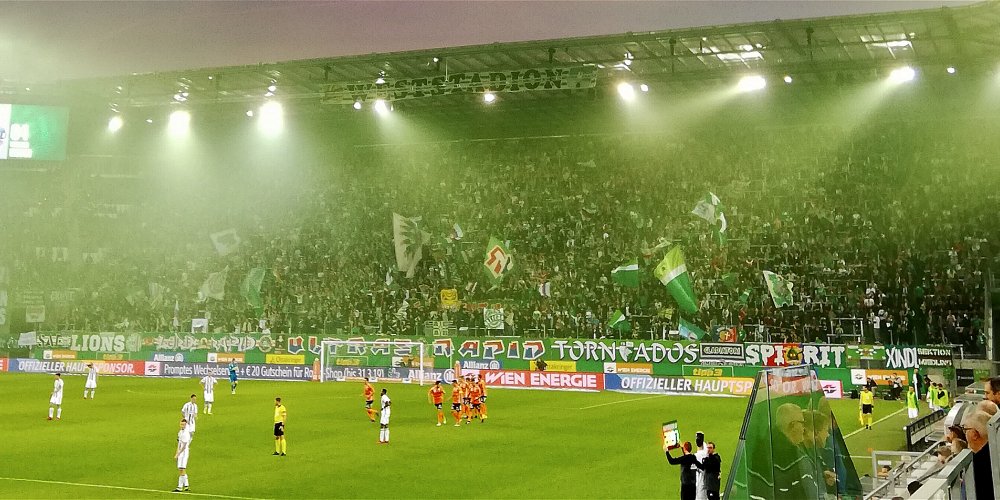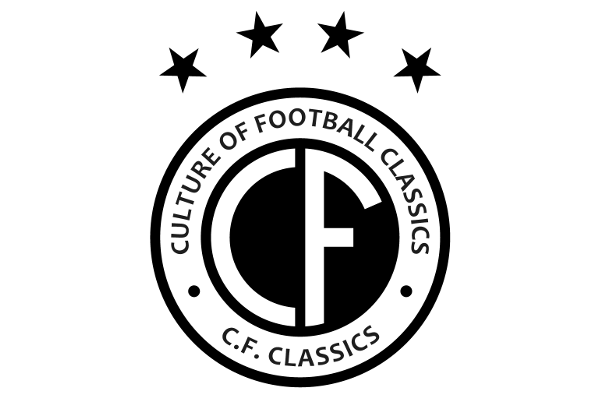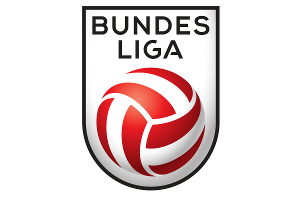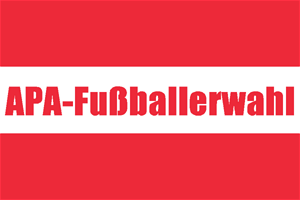Austrian Football Culture

Rapid Vienna Fans
Photo: OtherBundesliga.com
The fan scene in Austria is a tough one to characterise on the whole. Football unsurprisingly plays second fiddle to winter sports in the Alpine republic, but nonetheless there is a history of football fan culture in Austria and a number of committed fans - for better or worse!
Some chequered club histories help to explain the rather fractured fan scene, with many clubs being formed historically from a merger of two or more sports clubs (something which is also quite common in Germany). This brings with it a mixture of club colours and logos, as well as a fusion of the political and societal roles that those sports clubs once filled, which leaves many clubs with a history less linear than the ones we might be used to in England. Over time, certain clubs have been known to represent communities such as Austrian Jews, high-society, working classes and even right-wing movements, with some fan groups being banned from their own stadiums only to reappear under another guise and mix up the messages of what they actually represent. Tracing which club represents which community is therefore not a straightforward or clearly defined process in Austria!
One of the most well-known Austrian clubs is of course Red Bull Salzburg, and theirs is a relevant example. Owned by the energy drink manufacturer since 2005, they're now the dominant force in the domestic game, sweeping up almost all of the trophies in recent years, including being named Austrian football league winners eleven times in fourteen seasons since they first won it in 2007. However, they took over Austria Salzburg, who - for sponsorship reasons - had also been known as (amongst other names) Wüstenrot Salzburg, and more famously, Casino Salzburg; UEFA Cup finalists in 1994 in their iconic purple and white colours. Fans in Salzburg reformed the club post-takeover to keep the purple and white, and they now play as SV Austria Salzburg in the Regional league, whilst Red Bull live it up in the UEFA Champions League these days. Of course the Red Bull ownership has drawn ire from many fans outside of Mozart's city, with traditional giants unimpressed at the new footballing monopoly in the country - although it would be fair to say that they're probably not quite as hated as RB Leipzig in the German Bundesliga.
Talking of the other big sides, you might remember Rapid Vienna from their 90s European exploits. One of the classic club names of European football, they're the only team to regularly pull in over 20,000 fans on a home match day (as opposed to around 9,000 on average for Salzburg) and the Green and Whites enjoy a fierce rivalry with Austria Vienna, the team clad in purple hailing from the south of the city. With four meetings in most seasons, theirs is one of the most commonly played derbies in European football, but that doesn't ease the tension, far from it. Both clubs regularly have flare ups of trouble between their sizeable groups of Ultras, and when you add in friendships with other Ultra groups from clubs in Slovakia and further afield, there's always something to watch out for on derby day. A huge herd of Rapid Vienna fans were controversially penned in and detained by police en route to an away derby last year, whilst Austria fan groups invaded public transport lines to block people on their way to Rapid Vienna's Allianz Stadium recently, too. It's also not a great idea to casually sport a purple or green shirt in the "wrong" part of the city unless you're asking for at least some passing comments.
Elsewhere there are fallen giants like GAK from Austria's second city, Graz. GAK actually beat Liverpool (in the 1st leg) of a Champions League qualifier at Anfield in 2004 (the same campaign in which Liverpool went on to lift the trophy in Istanbul no less), but like so many clubs in Austria their time at the top was cut short by financial disaster. With the club strapped for cash they ended up in the lower leagues, and are still fighting back through the divisions, currently residing in the lower half of the second tier. GAK are one of only a handful of clubs in the 2nd league who can bring in crowds of over 1000, with one of the others being Wacker Innsbruck who share a similar tale of successes followed by financial woe, plus numerous names and identities over the years. Even smaller Bundesliga sides such as WSG Tirol, St. Pölten or Admira can struggle to get more than a few thousand through the gates on a weekend, with the league itself aiming to bring average gates up to 10,000 all round. For now that remains a pipe dream, with only Rapid Vienna, Austria, Sturm Graz, and Salzburg anywhere near five-figure crowds (with LASK a potential exception as they've sold out their miniature 6,000 capacity stadium for much of the last few seasons, and will probably have a great deal more fans when their new stadium is complete).
One thing which no fan can fail to notice is the complete lack of away support in Austrian football. SCR Altach (who play way out west close to Switzerland) have a reasonable excuse with huge travel times, but in any case it's just not the done thing over here. Only Rapid Vienna (and perhaps Austria and Sturm) travel in the hundreds, with a much more common sight being 10 to 20 hardy fans who were desperate not to miss out, huddled in a freezing cold away sector at one of the Bundesliga's village clubs. Thankfully it's a different story in the European games, and for internationals too, the fans turn out in force when the fixtures get important. Vienna's Ernst Happel Stadium played host to the EURO 2008 final, and despite the running track, it's quite a sight to behold when 55,000 squeeze in for a vital qualifier. We just hope those fans have something to shout about when they begrudgingly put club rivalries to one side and set off to support "Das Nationalteam" at EURO 2021!
This article was written by The Other Bundesliga, the Austrian football website and podcast that gives a deep insight, expert guests, interviews with the stars, and everything you could ever wish to know about the Austrian Bundesliga and Austria national team - in English!
You can find them on a number of different social media platforms:
- Twitter - @OtherBundesliga
- Insta - @otherbundesliga
- Website - www.otherbundesliga.com
- Podcast - anchor.fm/theotherbundesliga
- Patreon - patreon.com/otherbundesliga
Tweet



